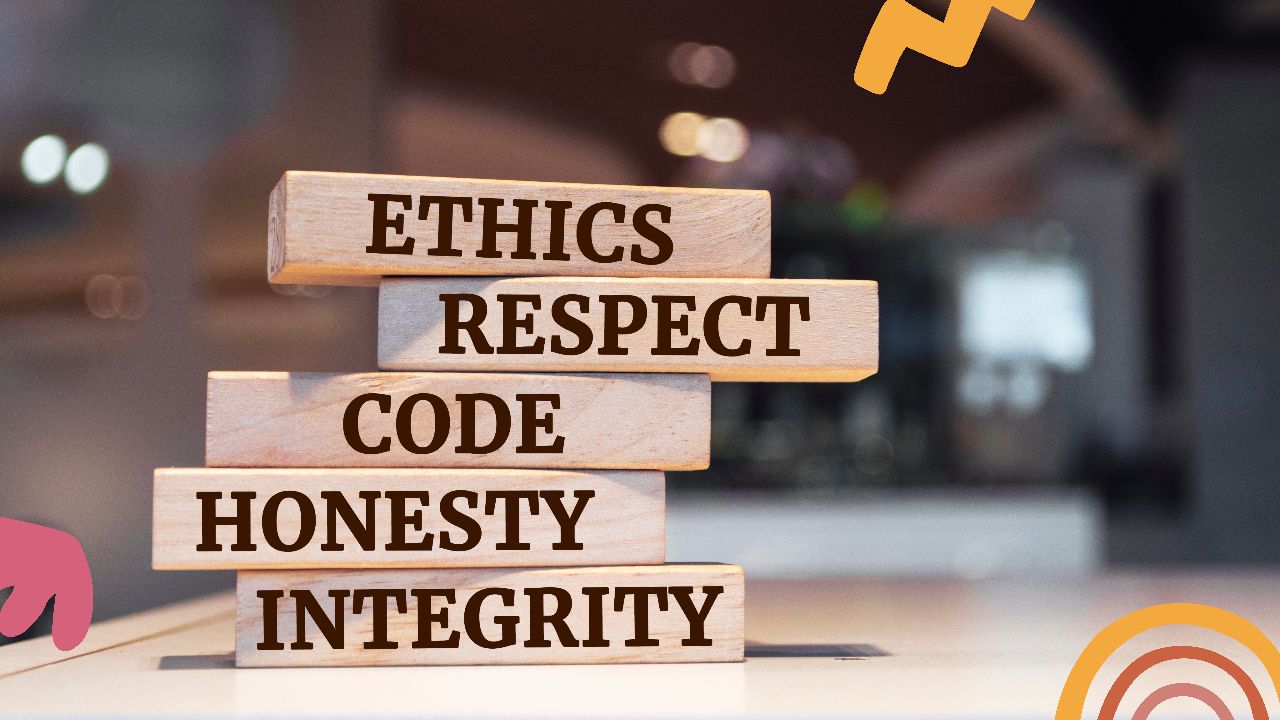The Imperative Role of Integrity in the Workplace
By Marco Franzoni • August 10, 2023

In an era where corporate scandals frequently grab headlines, the importance of integrity at work cannot be overstated. Indeed, integrity – anchored in honesty, ethics, and moral principles – is a fundamental cornerstone that shapes the culture, effectiveness, and reputation of any workplace.
But what does workplace integrity truly mean? In its simplest form, it's about consistency in actions, values, methods, measures, principles, and outcomes. It's about each individual being responsible and accountable for their actions, treating everyone with respect, and making decisions that positively contribute to the organization's reputation.
Workplace integrity is not merely a theoretical concept that makes for a good talking point at company meetings; it's an actionable and necessary component that fuels an organization's success. Embracing integrity means fostering a positive work environment where transparency, fairness, and respect reign supreme. It encourages ethical practices and cultivates team morale, ultimately leading to enhanced employee engagement and productivity.
Moreover, integrity in the workplace extends beyond the confines of the organization. It impacts how customers, partners, and the broader community perceive the organization, affecting everything from customer loyalty to the ability to attract top-tier talent.
To say that workplace integrity is important is an understatement; it's absolutely essential. It's the glue that holds an organization together, the shield that protects its reputation, and the beacon that guides its path forward. In the following sections, we will delve deeper into this crucial topic, exploring the role of integrity in fostering a positive and ethical workplace, building trust, promoting ethical behavior, and much more.
So, let's embark on this journey, understanding and championing the imperative role of integrity in the workplace.
Join our Newsletter
Transform your career with our personal growth insights. Get one valuable tip right in your inbox every Saturday morning.
Workplace Integrity and Its Components
Workplace integrity is more than just a high-sounding buzzword; it's a complex structure built upon multiple key components. These pillars—honesty, respect, responsibility, and loyalty—are the driving forces that make a difference between an average work environment and one that truly embodies integrity.
Honesty: The Bedrock of Integrity
Honesty is the bedrock of any relationship, and the workplace is no exception. Honesty lays the foundation for trust between employees, managers, and leaders. It's about being truthful in our communications and actions, demonstrating reliability, and promoting a culture of credibility and trust. An honest workplace empowers employees to voice their thoughts and ideas without fear of retribution, paving the way for creativity, innovation, and progress.
Respect: The Cornerstone of a Positive Work Environment
Respect is a fundamental human need. In the context of the workplace, it means valuing and acknowledging everyone's contributions, regardless of their role or seniority. It means treating everyone with dignity, fostering inclusivity, and encouraging diversity. A respectful workplace promotes equality, where everyone's voice is heard and valued, leading to a positive work environment brimming with collaboration and teamwork.

Responsibility: The Backbone of Accountability
Responsibility is about taking ownership of one's actions and decisions. It's closely tied to accountability, another key aspect of workplace integrity. A responsible employee not only fulfills their tasks diligently but also takes the initiative to fix any issues that might arise. They understand the consequences of their actions and are ready to face them. Responsibility fosters a culture of workplace accountability, where employees are motivated to deliver their best, contributing positively to the overall success of the organization.
Loyalty: The Heart of Organizational Commitment
Loyalty is the emotional tie that binds employees to the organization. It's about standing by the organization's mission, values, and goals—even in the face of adversity. Loyal employees are the advocates of the organization, standing up for it and working tirelessly to contribute to its success. Loyalty is crucial for fostering strong employee engagement and retention, both of which contribute to a more stable and successful organization.
Ethics and Moral Principles: The Guiding Light of Workplace Integrity
Finally, the role of ethics and moral principles in fostering workplace integrity cannot be overstated. These are the guiding lights that shape our actions and decisions at work. Ethical employees prioritize doing the right thing, even when no one is watching. They adhere to ethical standards and make decisions that align with the organization's values and mission. An ethical workplace is one where employees feel safe, valued, and motivated to perform at their best, making it a win-win for everyone involved.
In conclusion, workplace integrity is a complex but crucial component of any successful organization. By promoting honesty, respect, responsibility, loyalty, and ethics, companies can foster a positive work environment that encourages growth, success, and satisfaction among all its members.
Examples of Integrity in the Workplace
Seeing integrity in action can often be more powerful than any definition or explanation. Here are a few real-world examples of integrity at work, illustrating how accountability, diversity, and inclusivity play pivotal roles in enhancing the overall work environment.
Example 1: Prioritizing Accountability
Let's consider a situation where a team member makes an error on a significant project, leading to a delay in delivery. Instead of shifting the blame onto others or circumstances, this individual steps forward, takes responsibility for the mistake, and works overtime to rectify it. This act of taking ownership demonstrates a high degree of workplace integrity. It shows accountability and responsible decision-making, fostering trust among team members and leading to a strong, accountable team.
Example 2: Championing Diversity and Inclusivity

Imagine a team leader who actively ensures that every member of their diverse team has an equal opportunity to contribute to projects and decision-making processes. They recognize the unique strengths and perspectives that each team member brings and leverages these to the team's advantage. By championing diversity and inclusivity, they exhibit integrity and create an inclusive environment where everyone feels valued and heard. This promotes harmony and cooperation, leading to improved performance and employee satisfaction.
Join our Newsletter
Transform your career with our personal growth insights. Get one valuable tip right in your inbox every Saturday morning.
Example 3: Encouraging Open and Honest Communication
Consider a manager who regularly communicates openly with their team, provides constructive feedback, and encourages team members to share their thoughts and ideas. They foster an environment of transparency and openness, where honest communication is the norm rather than the exception. This openness is a reflection of their integrity, building trust within the team, and promoting a strong, collaborative work culture.
Example 4: Acting Ethically Even in Difficult Situations
Take, for instance, a company executive who discovers unethical practices within the organization. Instead of turning a blind eye, they choose to report it, despite the potential personal risks involved. Their commitment to doing the right thing, even when it's difficult, is a testament to their integrity. This sends a powerful message throughout the organization, reinforcing ethical standards, and contributing to a culture of honesty and integrity.
These examples demonstrate how integrity plays out in real-world situations and how it significantly impacts the work environment. Acts of integrity—whether big or small—can shape an organization's culture, foster trust and cooperation, and influence decision-making processes. They remind us that workplace integrity is more than just a concept—it's a practice that, when cultivated, can lead to a thriving, successful, and respectful workplace environment.
The Ethical Leader: Integrity Personified
At the heart of every thriving workplace brimming with integrity is an ethical leader. They play an indispensable role in shaping the culture of integrity at work. As a figure to look up to, they set the bar high, embodying the qualities of honesty, accountability, and ethics, thereby serving as a moral compass for the entire team.
The Role Model for Integrity
An ethical leader serves as a role model, embodying the moral principles crucial to promoting workplace integrity. They practice what they preach, ensuring their actions consistently align with their words. When a leader exhibits a high level of integrity, it creates a ripple effect. Their behaviors and attitudes towards work and decision-making processes trickle down, influencing how employees perceive their roles and responsibilities within the organization. This cascade of influence promotes a culture where integrity becomes a natural part of the day-to-day operations.
The role of a model is earned and there is a secret to getting this. Read our blog post on Executive presence: the one leadership quality no one told you about to run through the finish line.
Accountability and Decision-Making
For an ethical leader, accountability isn't just an afterthought—it's a guiding principle. They understand the importance of taking responsibility for their actions, decisions, and the outcomes thereof. This willingness to own their actions—be it a successful strategy or a less successful one—inspires the team to do the same, fostering accountability across the organization.

Moreover, ethical leaders prioritize moral principles in their decision-making processes. They don't simply opt for the easiest or the most profitable decision; instead, they consider the ethical implications of each choice. They weigh the potential impacts on their employees, customers, and the broader community, ensuring their decisions align with their moral and ethical values.
Morals in Leadership
Ultimately, the strength of an ethical leader lies in their steadfast commitment to their morals. They set the standard for what's acceptable and what's not, creating an environment where ethical practices are not just encouraged but expected. In doing so, they not only foster a positive work environment but also build trust among their team members, which is crucial for any successful organization.
Ethical leadership plays a fundamental role in fostering integrity within a workplace. Leaders who exhibit strong morals, accountable behaviors, and ethical decision-making inspire their teams to follow suit, creating a culture that values and practices integrity. If you're looking to hone your ethical leadership skills, consider exploring our business coaching services at Zella Life. Our expert coaches can guide you on the path to becoming the ethical leader your team needs.
Fostering Integrity: Building Trust and Promoting Ethical Behaviour
Fostering integrity within a work environment extends beyond just implementing rules and guidelines—it involves cultivating a culture that values honesty, credibility, and reliability. This culture, in turn, forms a sturdy foundation for building trust. Simultaneously, the presence of strong leaders and an ethical approach plays a vital role in promoting integrity.
Building Trust through Credibility, Honesty, and Reliability
The cornerstone of any successful organization is trust, which is largely fostered through credibility, honesty, and reliability. Employees tend to trust leaders who are not only credible but also consistently demonstrate honesty and reliability. This kind of trust can enhance the workplace environment, encourage team collaboration, and improve overall productivity.
Credibility can be cultivated by consistently delivering on promises, demonstrating expertise, and making fair and unbiased decisions. Honesty, on the other hand, involves open and transparent communication, being truthful even when it's difficult, and admitting mistakes. Reliability means doing what you say you will, being dependable, and meeting deadlines. Together, these elements build trust within a team, leading to a more cohesive and effective work environment.
Efficiency and effectiveness are key to achieving Credibility, Honesty, and Reliability. Learning our comprehensive guide on effective meetings is going to be a boost: Is that truly an important meeting? A quick guide to effective meetings.

Promoting Integrity through Strong Leadership and Ethical Approach
Strong leadership is another crucial aspect of promoting workplace integrity. Leaders who showcase ethical decision-making, accountable actions, and honest communication encourage their team members to do the same. By setting a positive example, leaders can cultivate a team that values integrity and ethical behavior, leading to a more respectful and inclusive work environment.
An ethical approach to leadership also involves considering the impact of decisions on all stakeholders, including employees, customers, and the community. Leaders can demonstrate this by promoting fairness, equality, and respect in all aspects of the business, thereby enhancing organizational values and fostering integrity.
Fostering Open Communication and Diverse Perspectives
A key strategy for fostering integrity is encouraging open communication and diverse perspectives. This involves creating an environment where everyone feels comfortable sharing their thoughts and ideas. Inclusive dialogue can lead to more innovative solutions and improved decision-making, enhancing team collaboration and overall workplace morale.
Furthermore, by valuing diverse perspectives, organizations can foster inclusivity and respect, which are central to a culture of integrity. Diversity in a workplace goes beyond just demographic differences—it involves valuing the unique experiences, ideas, and thoughts each team member brings to the table. Leaders can foster this by encouraging employees to share their viewpoints, acknowledging and respecting these perspectives, and integrating these insights into decision-making processes.
For more insight into fostering open communication and diverse perspectives, check out our blog post on soft skills for managers at Zella Life.
In essence, fostering integrity in a workplace requires a holistic approach, involving building trust, promoting ethical behavior, and encouraging open communication and diversity. These elements, when implemented effectively, create a positive work environment where integrity is not just valued but practiced.
Workplace Accountability and Ethical Decision-making
Fostering integrity in the workplace involves more than encouraging ethical behavior—it also involves promoting accountability and making ethical decisions consistently. Let's delve into the essence of responsibility, reliability, and transparency in workplace accountability, and the process and impact of ethical decision-making.
Responsibility, Reliability, and Transparency in Workplace Accountability
Workplace accountability is the commitment of an organization's members to take responsibility for their actions and decisions. This includes being reliable in delivering on commitments and being transparent about the processes and outcomes of those actions.
Responsibility in the workplace context is about taking ownership of tasks and ensuring they are completed effectively and efficiently. It's about following through on commitments and meeting expectations. Employees who exhibit responsibility are invaluable assets to their organizations—they foster trust and confidence within their teams and contribute to a positive workplace environment.
Reliability, closely tied to responsibility, involves consistently delivering on commitments and meeting set standards. A reliable employee demonstrates a strong work ethic and commitment to their role, contributing to increased productivity and team morale.
Transparency, the third pillar of workplace accountability, is about open and honest communication. It's about sharing information freely and openly, being upfront about challenges, and providing clear explanations for decisions and actions. When transparency is a part of an organization's culture, it encourages trust, strengthens relationships, and improves overall decision-making.
Ethical Decision-making Process and Impact
The process of ethical decision-making involves evaluating options and choosing the one that aligns with ethical standards and principles. It's about making decisions that are not only good for business but also consider the wellbeing of all stakeholders, including employees, customers, and the broader community.
The impact of ethical decision-making on a workplace is significant. It promotes a culture of integrity, where decisions are made with fairness, honesty, and respect. It enhances the reputation of the organization, promotes trust among stakeholders, and can even boost employee morale and engagement.
Ethical decision-making can also have a positive impact beyond the organization. It can contribute to societal wellbeing by promoting fairness and respect, and by considering the broader impact of business decisions.
In conclusion, fostering workplace accountability and making ethical decisions are crucial components of maintaining integrity at work. Through responsibility, reliability, transparency, and ethical decision-making, organizations can create a positive work environment where integrity is valued and practiced consistently.
Conclusion: The Imperative Role of Integrity
Throughout this exploration of integrity at work, we've seen the profound role it plays in shaping our workplaces. Integrity, defined by pillars like honesty, respect, responsibility, and loyalty, forms the foundation of a positive and ethical workplace environment.
Workplace integrity manifests through examples of accountability, diversity, and inclusivity. When individuals hold themselves accountable for their actions, respect diverse perspectives, and foster an inclusive work environment, trust within the team and the organization is built and decision-making improves.
Integral to the promotion of workplace integrity is the figure of the ethical leader. This role model exudes accountability, exercises sound moral judgment in decision-making, and embodies the moral principles that underpin integrity.
Through fostering credibility, honesty, and reliability, we've seen how building trust within an organization is possible. An ethical approach steered by strong leaders promotes integrity and opens up avenues for communication and the sharing of diverse perspectives.
Workplace accountability and ethical decision-making, underpinned by responsibility, reliability, and transparency, are vital components of integrity at work. When decisions are made with ethical considerations in mind, it not only promotes a culture of integrity but also positively impacts the broader society.
The future of workplaces where high integrity and ethical standards are upheld is bright and encouraging. As shown in this ZellaLife blog, these workplaces will be marked by increased trust, improved collaboration, and a more engaged and motivated workforce.
But the responsibility doesn't lie solely with leaders—every individual within an organization can and should contribute to building a culture of integrity at work. Whether it's through being honest, showing respect, taking responsibility, or demonstrating loyalty, each action we take can help to foster integrity in our workplaces.
So, as we move forward, let's all commit to fostering, promoting, and upholding integrity in our everyday work lives. Together, we can build workplaces that are not just productive and successful, but also ethical and inclusive.
Read more about: Leadership